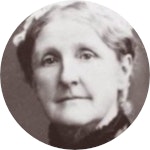Introductory Note:
In this reading Hannah Whitall Smith has touched an almost universal experience. At one time or another all of us have felt the heavy weight of duty. We are bowed low with the burden of integrity. Service drags and drains rather than uplifts and encourages.
Her answer: fall in love with Jesus over and over again. Let him work from the inside, giving us the grace-filled “want to” of love to replace the “have to” of duty. Her answer may not be complete but it certainly is central. Nothing is more at the heart of our discipleship to Jesus Christ than an ongoing, ever-deepening love relationship. This, in turn, draws us to love all peoples and gives us the desire to do his works upon the earth.
Richard J. Foster
Renovaré Founder
 Excerpt from Devotional Classics
Excerpt from Devotional Classics
The “Must I?” of Duty
There is, perhaps, no part of Christian experience where a greater change occurs, upon entering into this life hid with Christ in God, than in the matter of service.
In all the ordinary forms of Christian life, service is apt to have more or less of bondage in it; that is, it is done purely as a matter of duty, and often as a trial and a cross. Certain things, which at the first may have been a joy and a delight, become after a while weary tasks, performed faithfully, perhaps, but with much secret disinclination, and many confessed or unconfessed wishes that they need not be done at all, or at least that they need not be done so often.
The soul finds itself saying, instead of the “May I?” of love, the “Must I?” of duty. The yoke, which was at first easy, begins to gall, and the burden feels heavy instead of light.
The Treadmill of Daily Christian Work
One dear Christian expressed it once to me in this way: “When I was first converted,” she said, “I was so full of joy and love that I was only too glad and thankful to be allowed to do anything for my Lord, and I eagerly entered every open door. But after a while, as my early joy faded away, and my love burned less fervently, I began to wish I had not been quite so eager; for I found myself involved in lines of service that were gradually becoming very distasteful and burdensome to me.
“Since I had begun them, I could not very well give them up without exciting great remark, and yet I longed to do so increasingly. I was expected to visit the sick, pray beside their beds. I was expected to attend prayer-meetings, and speak at them. I was expected, in short, to be always ready for every effort in Christian work, and the sense of these expectations bowed me down continually.
“At last it became so unspeakably burdensome to me to live the sort of Christian life I had entered upon, and was expected to live, that I felt as if any kind of manual labor would have been easier; and I would have infinitely preferred scrubbing all day on my hands and knees to being compelled to go through the treadmill of my daily Christian work. “I envied,” she said, “the servants in the kitchen, and the women at the washtubs.”
A Constant Burden
This may seem to some like a strong statement; but does it not present a vivid picture of some of your own experiences, dear Christian? Have you never gone to work as a slave to his daily task, believing it to be your duty and that therefore you must do it, but rebounding like an Indian-rubber ball back into your real interests and pleasures the moment your work was over?
You have known of course that this was the wrong way to feel, and have been thoroughly ashamed of it, but still you have seen no way to help it. You have not loved your work; and, could you have done so with an easy conscience, you would have been glad to give it up altogether.
Or, if this does not describe your case, perhaps another picture will. You do love your work in the abstract, but in the doing of it you find so many cares and responsibilities connected with it, and feel so many misgivings and doubts as to your own capacity or fitness, that it becomes a very heavy burden, and you go to it bowed down and weary before the labor has even begun. Then also you are continually distressing yourself about the results of your work, and greatly troubled if they are not just what you would like; and this of itself is a constant burden.
The Things We Want to Do
Now, from all these forms of bondage the soul that enters fully into the blessed life of faith is entirely delivered. In the first place, service of any sort becomes delightful to it, because, having surrendered its will into the keeping of the Lord, He works in it to will and to do His good pleasure, and the soul finds itself really wanting to do the things God wants it to do.
It is always very pleasant to do the things we want to do, even if they are difficult to accomplish, or make our bodies tired. If our will is really set on a thing we view the obstacles that lie in the way of reaching it with a sublime indifference, and we laugh to ourselves at the idea of any opposition or difficulties which might hinder us. How many men have gone gladly to the ends of the world in search of worldly fortunes, or to fulfill worldly ambitions, and have scorned the thought of any “cross” connected with it! How many mothers have congratulated themselves, and rejoiced over the honor done their sons in seeing them promoted to some place of power and usefulness in their country’s service, although it has involved perhaps years of separation, and a life of hardship for their dear ones! And yet these same men, and these very mothers, would have felt and said that they were taking up crosses too heavy almost to be borne, had the service of Christ required the same sacrifice of home, and friends, and worldly ease.
Constraining Us by Love
It is altogether the way we look at things, whether we think they are crosses or not. And I am ashamed to think that any Christian should ever put on a long face and shed tears over doing a thing for Christ which a worldly person would be only too glad to do for money.
What we need in the Christian life is to get believers to want to do God’s will as much as other people want to do their own will. And this is the idea of the Gospel. It is what God intended for us; and it is what He promised. In describing the new covenant in Hebrews 8:6 – 13, He says it shall no more be the old covenant made on Sinai, — that is, a law given from the outside, controlling a man by force, — but it shall be a law written within, constraining us by love.
“I will put my laws,” He says, “into their minds, and write them on their hearts.” This can mean nothing but that we shall love His law; for anything written in our hearts we must love. “And putting it into our minds” is surely the same as God working in us to “will and to do of his good pleasure,” and means that we shall will what God wills, and shall obey His sweet commands, not because it is our duty to do so, but because we ourselves want to do what He wants us to do.
God’s Way of Working
Nothing could possibly be conceived more effectual than this. How often have we thought, when dealing with our children, “Oh, if I could only get inside of them, and make them want to do just what I want, how easy it would be to manage them then!” How often in practical experience we have found that to deal with cross-grained people we most carefully avoid suggesting our wishes to them, but must in some way induce them to suggest the thing themselves, sure that there will then be no opposition with which to contend. And we, who are by nature a stiff-necked people, always rebel more or less against a law from outside of us, while we joyfully embrace the same law springing up within.
God’s way of working, therefore, is to get possession of the inside of us, to take the control and management of our will, and to work it for us. Then obedience is easy and a delight, and service becomes perfect freedom, until the Christian is forced to explain, “This happy service! Who could dream earth had such liberty?”
Entire Control
What you need to do, then, dear Christian, if you are in bondage in the matter of service, is to put your will over completely into the hands of your Lord, surrendering to Him the entire control of it. Say, “Yes, Lord, yes!” to everything, and trust Him so to work in you to will as to bring your whole wishes and affections into conformity with His own sweet, and lovable, and most lovely will.
I have seen this done often in cases where it looked beforehand an utterly impossible thing. In one case, where a lady had been for years rebelling fearfully against a little act of service which she knew was right, but which she hated, I saw her, out of the depths of despair, and without any feeling whatever, give her will in that matter up into the hands of her Lord, and begin to say to Him, “Thy will be done; Thy will be done!” And in one short hour that very thing began to look sweet and precious to her.
The Lord Is Our Burden-Bearer
Many Christians, as I have said, love God’s will in the abstract, but carry great burdens in connection with it. From this also there is deliverance in the wonderful life of faith. For in this way of life no burdens are carried, no anxieties felt. The Lord is our burden-bearer, and upon Him we must lay off every care. He says, in effect, “Be careful for nothing, but make your requests known to me, and I will attend to them all.”
Be careful for nothing, He says, not even your service. Why? Because we are so utterly helpless that no matter how careful we were, our service would amount to nothing! What have we to do with thinking whether we are fit or not fit for service? The Master-workman surely has a right to use any tool He pleases for His own work, and it is plainly not the business of the tool to decide whether it is the right one to be used or not. He knows; and if He chooses to use us, of course we must be fit. And in truth, if we only knew it, our chief fitness is in our utter helplessness. His strength is made perfect, not in our strength, but in our weakness. Our strength is only a hindrance.
Excerpted from Devotional Classics, © 1990 Renovaré. Originally from Whitall Smith, Hannah. The Christian’s Secret of a Happy Life. New Kensington, PA: Whitaker House, 1983.
Photo by Keagan Henman on Unsplash
Text First Published January 1990 · Last Featured on Renovare.org May 2021


